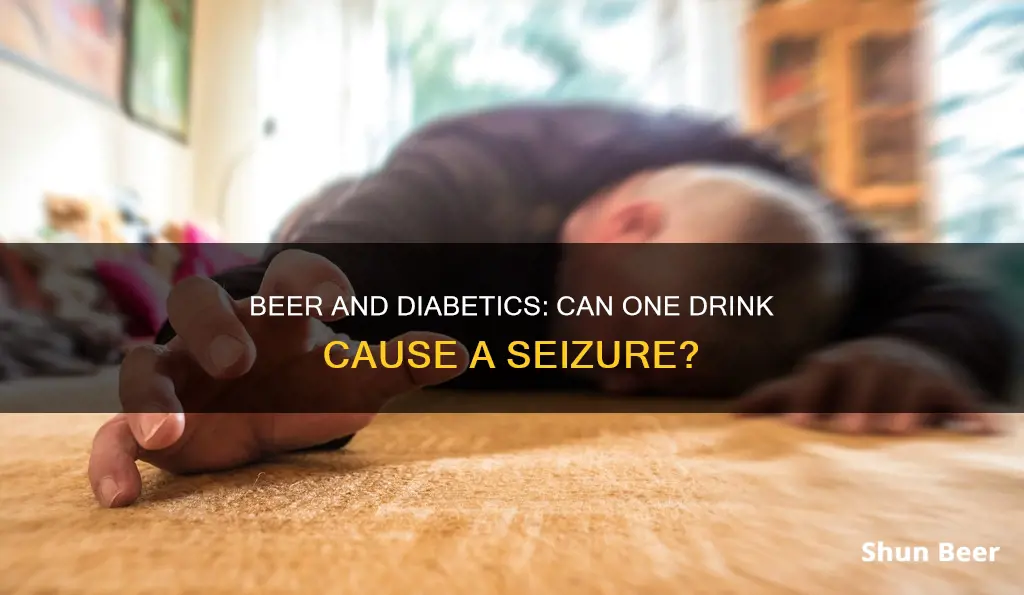
Alcohol can cause blood glucose levels to rise or fall, depending on how much you drink. It can also interact with diabetes medications, which can lead to hypoglycemia or insulin shock, a medical emergency. The liver, which regulates blood sugar, has to work to remove alcohol from the blood instead of regulating blood sugar. This can lead to hypoglycemia, especially if you drink on an empty stomach. Alcohol can also cloud your judgment, so you may not realize your blood sugar is low. Drinking any form of alcohol can affect your blood sugar levels, so it's important to limit your intake and be aware of the symptoms of hypoglycemia, which can be similar to a drunken state.
| Characteristics | Values |
|---|---|
| Can drinking one beer cause a diabetic seizure? | Drinking one beer will not directly cause a diabetic seizure. However, it can lead to hypoglycemia (low blood sugar) which, if not addressed, may result in a seizure. |
| Risk factors | Family history, age, ethnic background, being overweight, excessive alcohol intake |
| Safe alcohol consumption for diabetics | No more than one drink a day for women and up to two drinks a day for men. |
| Alcohol's effect on blood sugar | Alcohol interferes with the liver's ability to regulate blood sugar, potentially causing hypoglycemia or hyperglycemia. |
| Alcohol and diabetes medications | Alcohol can interact with diabetes medications, particularly insulin and sulfonylureas, increasing the risk of hypoglycemia. |
| Preventing hypoglycemia when drinking | Avoid drinking on an empty stomach, eat food or snacks containing carbohydrates, monitor blood sugar levels, and stay hydrated. |
| Calories and carbs in alcohol | Alcoholic drinks can be high in calories and carbs, especially beer and sweet wines. |
| Alcohol's impact on health | Excessive alcohol consumption can lead to raised blood pressure, neuropathy (nerve damage), dehydration, sleep disturbances, certain cancers, and heart disease. |
What You'll Learn

Alcohol and low blood sugar
Alcohol and diabetes can be a tricky combination. While it is possible to drink alcohol with diabetes, it's important to be aware of the effects on your body and how to manage them. Drinking alcohol can increase your risk of having a hypo because it interferes with your blood sugar levels.
The liver plays a crucial role in stabilising blood sugar levels. It does this by acting as a reservoir for carbohydrates. When you eat, your liver stores sugar as glycogen, which it can then release as glucose into the bloodstream to keep your body's fuel steady. The liver also metabolises alcohol, and it cannot perform both these functions at the same time. So, when you drink alcohol, your liver prioritises metabolising it over maintaining your blood sugar levels. This can lead to hypoglycaemia, or low blood sugar.
The risk of hypoglycaemia is higher if you drink alcohol on an empty stomach or when your blood sugar is already low. It's important to be aware that your risk of having a hypo doesn't go away after you stop drinking—in fact, it increases and can last up to 24 hours. This is because alcohol can affect your body's ability to recover when your blood sugar levels are dropping.
Symptoms of hypoglycaemia include lightheadedness and dizziness, which are also signs of drunkenness. This can make it challenging to tell if someone is experiencing hypoglycaemia or intoxication. If you often have hypoglycaemia unawareness, a condition where you don't recognise that your blood sugar is low, drinking alcohol can be especially risky.
To manage drinking alcohol with diabetes, it's recommended to eat food while you drink and avoid drinking on an empty stomach. It's also important to monitor your blood glucose levels before, during, and after drinking, and up to 24 hours afterwards. Carrying hypo treatments and wearing medical ID that states you have diabetes are also advised.
In terms of alcohol type, it's recommended to avoid low-sugar beers and ciders, as these have more alcohol. Low-alcohol wines should also be limited as they often have more sugar. Spirits with diet or sugar-free mixers are a better option, as wine and spirits are practically carbohydrate-free. However, it's important to note that high-carb drinks may not be the best option when trying to prevent hypoglycaemia, as liquid sugars are quickly absorbed by the body. Food, on the other hand, is digested more gradually and provides better protection against lows.
It's also important to be aware that alcohol can affect your weight, as it contains a lot of calories. Additionally, excessive alcohol intake is associated with an increased risk of type 2 diabetes, as well as other health risks such as raised blood pressure, nerve damage, dehydration, and an increased risk of certain cancers and heart disease. Therefore, it's recommended to stay within government guidelines for alcohol consumption, which advise not to regularly drink more than 14 units a week, for both men and women.
The Science Behind Beer Koozies: Do They Really Work?
You may want to see also

Alcohol and liver function
Alcohol-related liver disease (ARLD) refers to liver damage caused by excess alcohol intake. The liver is one of the most complex organs in the body, performing functions such as filtering toxins from the blood, aiding digestion, regulating blood sugar and cholesterol levels, and helping fight infection and disease.
Each time the liver filters alcohol, some of the liver cells die. While the liver is capable of regenerating itself, prolonged alcohol misuse over many years can reduce its ability to do so, resulting in serious and permanent liver damage. ARLD has several stages of severity and associated symptoms. The condition is usually only diagnosed once the liver has been severely damaged, exhibiting symptoms such as jaundice, swelling in the ankles and abdomen, confusion or drowsiness, and vomiting blood or passing blood in stools.
The stages of ARLD include:
- Alcoholic fatty liver disease: This is the first stage of ARLD, caused by drinking a large amount of alcohol, even for just a few days. Fatty liver disease rarely causes symptoms but serves as a warning sign of harmful alcohol consumption. It is reversible if one stops drinking alcohol for a few weeks to a few months.
- Alcoholic hepatitis: This is a potentially serious condition caused by alcohol misuse over a longer period. It can also be triggered by binge drinking. The liver damage associated with mild alcoholic hepatitis is reversible if one stops drinking permanently. However, severe alcoholic hepatitis is life-threatening.
- Cirrhosis: This stage of ARLD involves significant scarring of the liver. It is generally irreversible, but stopping alcohol consumption immediately can prevent further damage and increase life expectancy.
To prevent ARLD, it is recommended to stop drinking alcohol or adhere to low-risk drinking guidelines. Reducing or quitting alcohol consumption will have short-term and long-term benefits for liver health.
While the direct focus here is on alcohol and liver function, it is worth noting that alcohol consumption can also affect individuals with diabetes. Alcohol can worsen blood sugar control in diabetics, leading to excessive or dangerously low blood sugar levels. It can also worsen diabetes-related complications, such as disturbances in fat metabolism, nerve damage, and eye disease.
Non-Alcoholic Beer: Healthy Daily Habit or Not?
You may want to see also

Alcohol and weight gain
Alcohol can cause weight gain in several ways. Firstly, it stops the body from burning fat. Secondly, it is high in calories (or kilojoules). Thirdly, it can make you feel hungrier. And finally, it can lead to cravings for salty and greasy foods.
Whether or not you will gain weight from drinking alcohol depends on a number of factors, including what you drink, how much you drink, how often you drink, what you eat when you drink, your level of physical activity, and your health.
Drinking alcohol, especially in excessive amounts, has many other serious health risks, including high blood pressure, high triglycerides, insulin resistance, heart disease, stroke, liver disease, and some cancers.
If you are trying to lose weight, reducing your alcohol intake can help. Alcoholic drinks can contain as many calories as a meal, but without the nutrients. It's important to watch the number and type of drinks you choose, and to be mindful of how drinking affects your eating habits.
According to health experts, moderate drinking is defined as no more than one drink per day for women and no more than two drinks per day for men. If you are trying to lose weight, you may want to drink less than this.
The amount of calories in alcoholic drinks varies. A regular beer contains about 150 calories per 12-ounce glass, while a light beer contains about 100 calories. Wine is around 100 calories for a 5-ounce glass, and distilled alcohol (such as gin, rum, vodka, or whiskey) is about 100 calories for a 1.5-ounce serving. Mixed drinks can contain even more calories, with a pina colada containing about 500 calories in a 7-ounce glass.
It's important to note that the sizes of drinks served in restaurants or bars are often larger than the standard amounts, so it's easy to consume more calories and alcohol than you realise.
In addition to the direct impact of alcohol on weight gain, drinking can also affect your food choices, causing you to make poorer food choices and consume more calories overall.
Beer Tube Screens: How Do They Work?
You may want to see also

Alcohol and neuropathy
Alcoholic neuropathy is nerve damage caused by excessive drinking. It can affect both the autonomic nerves, which regulate internal body functions, and the nerves that control movement and sensation. Symptoms of alcoholic neuropathy include numbness in the arms and legs, painful sensations in the arms and legs, muscle weakness, cramps, and spasms, heat intolerance, and gait problems.
The exact cause of alcoholic neuropathy is unknown, but it is likely due to a combination of direct poisoning of the nerves by alcohol and poor nutrition associated with alcoholism. Alcohol abuse can lead to malnutrition, as well as deficiencies in vitamins such as thiamine (vitamin B1), pyridoxine (vitamin B6), and folic acid. These nutritional deficiencies can contribute to nerve damage.
In addition to nutritional deficiencies, alcohol and its metabolites can have direct toxic effects on neurons, affecting their cellular structure and function. This includes demyelination of neurons and damage to the cellular cytoskeleton. The toxic effects of alcohol on neurons can be further exacerbated by the production of acetaldehyde, a highly reactive metabolite of alcohol.
Chronic alcohol consumption can also disrupt axonal transport and cytoskeletal properties, which are essential for maintaining nerve health. This can lead to length-dependent axonal degeneration and a reduction in the myelination of neural fibres.
The treatment for alcoholic neuropathy focuses on stopping alcohol abuse and improving nutrition. Abstinence from alcohol and supplementation with vitamins, especially thiamine and folic acid, can help improve nerve health and function. Physical therapy and orthopedic appliances may also be needed to maintain muscle function and limb position. Additionally, medications may be prescribed to treat pain and uncomfortable sensations caused by nerve damage.
Skunked Beer: Is It Safe to Drink?
You may want to see also

Alcohol and medication
Alcohol can affect blood sugar levels in patients with diabetes. Both low blood sugar (hypoglycemia) and high blood sugar (hyperglycemia) may occur, depending on how much and how often you drink. Combining alcohol with medications that also lower blood sugar can result in serious interactions due to an additive effect.
Alcohol and Metformin
Metformin is a popular, effective, and inexpensive medication that doctors prescribe for the treatment of type 2 diabetes. It works by improving insulin sensitivity, promoting the uptake of glucose into tissues, and reducing sugar levels in the bloodstream. Doctors are prescribing metformin more and more frequently to people with prediabetes. The use of the drug in people with type 1 diabetes who are also overweight may reduce insulin need and increase metabolic control.
The manufacturer information for metformin states that you should avoid the combination of metformin with excessive alcohol use. Metformin and alcohol both put stress on the liver, intensifying the harmful effects of both and increasing the risk of liver complications. The side effects of metformin can be life-threatening when a person takes it while drinking excessive amounts of alcohol.
Alcohol and Chlorpropamide
A disulfiram-like reaction to alcohol has been reported with the use of chlorpropamide with symptoms such as flushing, headache, and nausea, but rarely with other drugs in the sulfonylurea class (for example, glipizide, glimepiride, glyburide).
Alcohol and Semaglutide or Tirzepatide
Moderate alcohol consumption generally does not affect blood sugar levels if your diabetes is under control. But because alcohol use may change your blood sugar levels, you should ask your doctor first if you can drink while taking these medicines.
General Guidelines for Alcohol Consumption with Diabetes
- Ask your healthcare provider if it's OK for you to drink alcohol.
- It is important to know how to recognize the symptoms of low blood sugar if you choose to drink.
- If your diabetes is not well controlled, you should avoid the use of alcohol.
- Do not drink if you are pregnant, driving or engaging in other hazardous activities, or being treated for alcohol use disorder.
- Do not drink on an empty stomach and stay hydrated with water.
- Remember to include the carbohydrates from any alcohol you drink in your daily carbohydrate count.
- Monitor your blood sugar before, during, and after drinking alcohol, and check your blood sugar levels before going to bed.
- Do not drink on an empty stomach or after exercising as this may also lower blood sugar levels.
- Always wear a diabetes medical ID tag to help identify your medical condition if needed for emergency personnel.
- Drinking more than three drinks daily can lead to higher blood sugar and complications such as an increased risk for some types of cancer, pancreatitis, liver disease, gallstone formation, accidents, trauma, and alcohol use disorder, among other conditions.
Beer Belly Blues: Why Beer Upsets Your Stomach
You may want to see also







